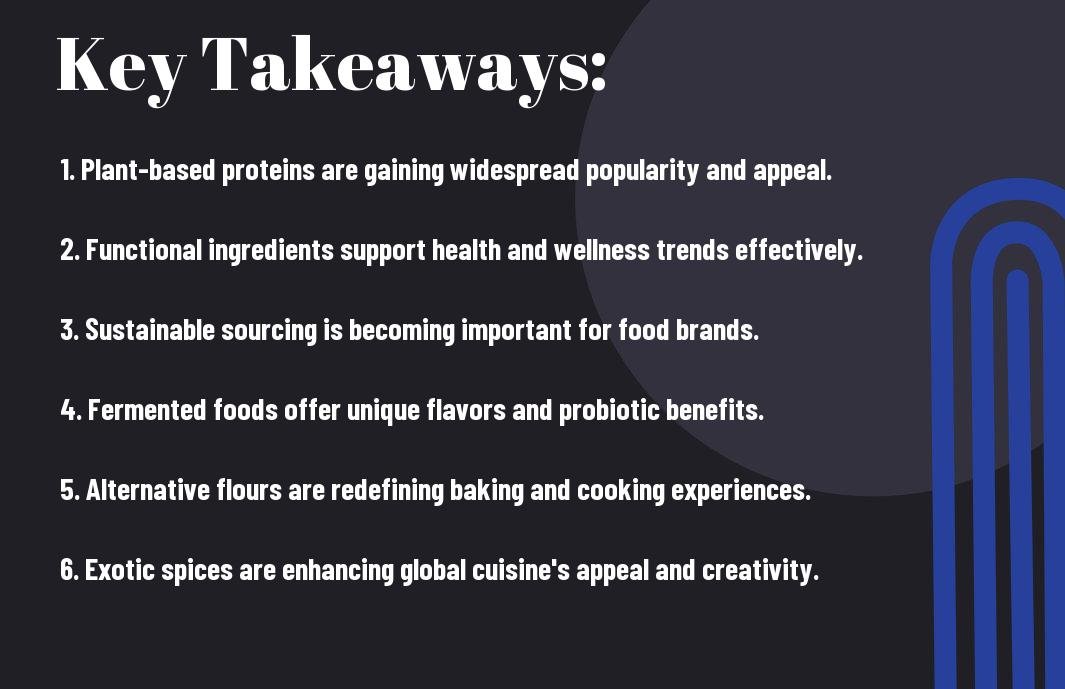Most people are unaware of how innovative ingredients are reshaping your culinary landscape and influencing food news around the globe. From plant-based proteins to functional mushrooms, these ingredients are not only adding variety to your meals but also boosting nutritional value and promoting sustainability. As you explore the latest trends, you’ll discover how these additions can enhance your health and culinary experiences while appealing to environmentally-conscious choices. Dive into the vibrant world of contemporary food innovations to see how your plate is being transformed.

Emerging Plant-Based Proteins
While the demand for sustainable and nutritious food options grows, emerging plant-based proteins are paving the way for a dietary revolution. You may be surprised to find that next-gen proteins like pea protein, mycelium, and fungi offer unique benefits that challenge traditional sources of protein. With increasing innovation in the food industry, these ingredients are not only addressing health concerns but also providing environmental solutions. Your meals can now be enriched with these versatile and eco-friendly choices, transforming your diet and lifestyle.
Pea Protein
Beside being an excellent source of protein, pea protein has gained popularity for its ethical and health benefits. It is hypoallergenic, making it a suitable alternative for those with dairy or soy allergies. You can incorporate this plant-based protein into smoothies, snacks, and even baked goods, enhancing the nutritional profile while maintaining great taste.
Mycelium and Fungi
Fungi, particularly mycelium, are emerging as groundbreaking sources of protein that can redefine your diet. They create a unique texture that resembles meat, making them an appealing substitute for traditional proteins. With their rapid growth cycle and minimal environmental impact, these ingredients not only provide imperative nutrients but also promote sustainability.
In addition, mycelium and fungi are rich in fiber and other important nutrients that can benefit your health. With an expanding range of food products utilizing mycelium, you’ll find options like plant-based meats and innovative snacks that not only satisfy your hunger but also offer a sustainable choice. They help reduce carbon footprints and resource consumption, making your dietary decisions contribute positively to the planet’s well-being.
Fermented Ingredients
It’s no surprise that fermented ingredients are taking the culinary world by storm. They offer not only unique flavors and textures but also a wealth of health benefits. From tangy kimchi to smooth miso, these ingredients are transforming your dishes and enhancing your overall wellness. As chefs and home cooks alike embrace fermentation, you can easily incorporate these innovative elements into your meals, making them tastier and more nutritious.
Kombucha and Its Benefits
Fermented drinks like kombucha have gained popularity due to their refreshing taste and numerous health benefits. This bubbly elixir is made by fermenting sweetened tea, introducing a colony of beneficial bacteria and yeast. Packed with antioxidants and probiotics, kombucha is believed to support digestion, boost immunity, and foster overall gut health. Drinking kombucha regularly may contribute to your well-being and add a delicious twist to your hydration routine.
Gut Health and Probiotics
Health plays a vital role in your overall well-being, and gut health is at the forefront of this conversation. Probiotics found in fermented ingredients can significantly impact digestive health by promoting a balanced gut microbiome. They may help alleviate symptoms of bloating and irregularity while enhancing nutrient absorption. In fact, studies suggest that a balanced gut can lead to improved mood and even a stronger immune response. Prioritizing probiotics in your diet could serve to enhance both your physical and mental health by fostering a thriving digestive system.
In fact, incorporating more fermented foods into your diet can actively benefit your digestive system. Probiotics in these foods promote a healthy variety of gut bacteria, which can lead to better digestion and help combat inflammation. Additionally, a balanced gut microbiome can significantly reduce the risk of gastrointestinal disorders. Furthermore, these beneficial bacteria can even help manage stress levels, creating a positive feedback loop that supports both physical and mental well-being. With this knowledge, you can make informed dietary choices that contribute to long-lasting health.

Adaptogens and Functional Botanicals
For many, integrating adaptogens and functional botanicals into your diet can offer a unique approach to enhancing overall well-being. These natural substances are known for their ability to help your body adapt to stress, improve mental clarity, and promote resilience. As the contemporary food scene evolves, these ingredients are becoming increasingly prominent in wellness products, teas, and food items, supporting both physical and mental health in a holistic manner.
Ashwagandha and Stress Relief
An ancient herb famed for its stress-relieving properties, ashwagandha has gained tremendous popularity in the wellness community. Known for its ability to lower cortisol levels and combat anxiety, incorporating ashwagandha into your routine may lead to improved mood and overall mental clarity. You can find it in supplements, powders, and even as a functional ingredient in various food and beverage offerings.
Other Popular Adaptogens
For those looking to enhance their wellness journey, numerous other adaptogens are making waves in contemporary food news. Ingredients like rhodiola, known for its energy-boosting effects, and holy basil, praised for its mood-enhancing properties, are also gaining traction. You might explore options like maca powder for hormonal balance or cordyceps for improved athletic performance. By incorporating these adaptogens into your diet, you can take advantage of their potential benefits, enhancing both your physical and mental vitality.
Also, it’s necessary to consider your individual health conditions before introducing adaptogens into your diet. Some adaptogens can interact with medications, so consult with a healthcare professional if you have concerns. While many find value in these powerful ingredients, their effects can vary, and understanding how they fit into your personal wellness strategy is vital for achieving your desired outcomes. Prioritize safe consumption and the potential benefits to enhance your lifestyle.
Sea Vegetables and Ocean-Based Ingredients
To embrace the future of food, many chefs and home cooks are turning to sea vegetables and ocean-based ingredients. These sustainable sources not only enhance flavors but also contribute to global food security. As Renovation and reinvention are key to saving our food, integrating ingredients like kelp and dulse in your meals can elevate your culinary repertoire while promoting marine ecology.
Nutritional Benefits of Seaweed
Nutritional value is one of the most compelling reasons to incorporate seaweed into your diet. Rich in important vitamins, minerals, and antioxidants, seaweed provides a natural source of iodine, supporting thyroid health, while also being low in calories. Regular consumption can enhance gut health, boost immunity, and improve overall well-being.
Sustainable Sourcing
Vegetables cultivated from ocean sources offer not only health benefits but also a sustainable option for conscientious foodies. Buzzing with innovation, ocean farming presents an opportunity to reduce your carbon footprint while preserving biodiversity. With a rising demand for environmentally friendly solutions, sourcing sea vegetables sustainably ensures that you’re supporting the planet.
Indeed, sustainable sourcing of sea vegetables involves practices that promote marine habitat restoration and reduce environmental impact. By choosing products sourced from well-managed farms or foraging programs, you can enjoy delicious seaweed varieties while minimizing overfishing and pollution. Opting for responsibly harvested sea products helps maintain the delicate balance of marine ecosystems, providing you with the knowledge that your culinary choices are positively impacting the future of our oceans.
Insect Protein and Alternative Sources
Unlike traditional livestock, insects are emerging as a sustainable protein source that aligns with contemporary dietary trends. These tiny creatures pack a mighty punch in terms of nutrition and environmental impact. With a growing awareness of food security and climate change, you may find this innovative ingredient increasingly present in your meals or snack options.
Nutritional Profile of Insects
Sources reveal that insects boast a remarkable nutritional profile, often exceeding conventional protein sources in necessary nutrients. They provide high-quality protein, vitamins, and healthy fats that can play a significant role in a balanced diet.
Environmental Impact Comparison
Insects are not only nutritious but also have a significantly reduced environmental impact compared to traditional livestock.
Environmental Impact Comparison
| Factor | Insect Farming |
| Land Usage | Minimal |
| Water Consumption | Low |
| Greenhouse Gas Emissions | Significantly lower |
| Feed Conversion Efficiency | High |
Considering the environmental impact of your food choices is necessary. Insects require significantly lower amounts of land, water, and feed compared to traditional livestock, making them an eco-friendly alternative in your diet. The reduction in greenhouse gas emissions associated with insect farming highlights the positive role they can play in combating climate change. By incorporating insect protein, you can help pave the way for a more sustainable food future.

Novel Sweeteners and Flavor Enhancers
Once again, the food industry is witnessing a remarkable transformation with the introduction of novel sweeteners and flavor enhancers. These innovative ingredients not only cater to health-conscious consumers, but they also provide unique taste profiles that elevate your dishes. From sugar substitutes that mimic traditional sweetness without the calories, to flavor enhancers that amplify the natural tastes of your meals, the potential of these ingredients is vast and exciting for culinary enthusiasts and professionals alike.
Natural Sweeteners
Below, you’ll find that natural sweeteners like stevia, monk fruit, and agave nectar are gaining popularity as healthier alternatives to conventional sugar. These sweeteners offer a variety of flavor profiles and are often lower in calories, making them a desirable choice for those looking to reduce sugar intake while still enjoying the sweetness in your recipes. They blend seamlessly into both beverages and desserts without compromising on taste.
Umami and Taste Innovation
Innovation in food is not limited to sweeteners; it extends to the exploration of umami, the fifth taste, which enhances the overall flavor experience. Texture and depth are increasingly important for your dining experience, making the incorporation of umami-rich ingredients, such as mushrooms, fermented foods, and seaweed, an vital trend. Chefs and home cooks alike are discovering how these components can transform basic dishes into savory masterpieces.
Hence, umami and taste innovation encourage you to explore new dimensions in your cooking. By incorporating ingredients such as miso, tomato paste, and Parmesan cheese, you can enhance the flavors in your meals significantly. These taste innovations not only appeal to your palate but also provide a unique dining experience that engages all the senses. As you examine into the world of umami, you will discover that these flavors work in harmony with traditional dishes while promoting a deeper appreciation for culinary art.
Summing up
Conclusively, as you explore the landscape of contemporary food news, you’ll encounter an array of innovative ingredients redefining culinary experiences. From plant-based proteins to functional superfoods, these elements are not just trends—they’re transformative forces enhancing flavor, nutrition, and sustainability. By embracing these ingredients, you can elevate your own cooking and stay informed about the latest developments in the food industry. Engaging with these innovations will not only enrich your meals but also support a more conscious and forward-thinking approach to eating.









